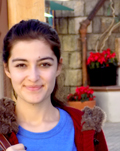People

Jeffrey Tyner, Ph.D.
Professor
Cell, Developmental and Cancer Biology
Email Dr. Tyner
Graduate program memberships
Program in Mollecular and Cellular Biosciences
Cell and Developmental Biology
Cancer Biology
Professional memberships
American Society of Hematology
American Associate for Cancer Research
American Association for the Advancement of Science
Education
1995-1999 - B.A., Grinnell College
1999-2005 - Ph.D., Washington University School of Medicine
Experience
2005-2010 - Postdoctoral Fellow, lab of Brian Druker, OHSU
2010-2012 - Research Assistant Professor, Department of Medicine, OHSU
2012-present - Assistant Professor, Cell, Developmental and Cancer Biology, OHSU
Tyner Lab

Alisa Damnernsawad, Ph.D.
Postdoctoral Researcher
Education: B.Sc., biology, Mahidol University, Ph.D., cancer biology, University of Wisconsin-Madison
Scientific interests: Acute Myeloblastic Leukemia is a disease with high heterogeneity of genetic lesions. Targeted therapy using small molecule inhibitors is an important factor toward precision medicine for patients with AML. Several targeted therapeutic drugs have shown promising results on patients who have AML. However, most patients relapse due to the development of drug resistance. Understanding how AML cells gain resistance toward small molecule inhibitors is necessary and critical to improve the treatment regimen for those patients. I am interested in elucidating the mechanism of drug resistance in AML, which can lead to possible approaches to prevent or overcome the cells that become drug resistant. I am part of the research group studying the mechanism of drug resistance toward diverse types of small molecule inhibitors in AML by utilizing CRISPR genome wide screening.

Fatma Eryildiz
Graduate Student
Education: M.S. in progress, Institute of Environmental Health and Division of Environmental and Biomolecular Systems, biochemistry and molecular biology track, Oregon Health & Science University, B.S., molecular biology and genetics, Istanbul University, Istanbul
Scientific interests: My main research interest is functional studies on cellular signaling pathways, particularly tyrosine kinases. In order to understand their activation mechanisms and abnormalities in those, I study most frequent kinase vulnerabilities, which we have detected in patient samples in cancer cell line models by silencing/inhibition kinases. I mostly use BeatAML data for that purpose. For analyzing and visualizing this valuable data-set, improving my skills on bioinformatics and computational genomics is also one of my research goals.

Tamilla Nechiporuk, Ph.D.
Senior Research Associate
Education: B.S., medical cybernetics, Russian National Medical University, Moscow, Russia, M.S., biomathematics, University of California Los Angeles, Los Angeles, CA, Ph.D., human genetics, University of Utah, Salt Lake City, UT
Scientific interests: Acute Myeloblastic Leukemia is a devastating disorder, predominantly in older adults, more rarely in children and young adults. Enormous progress has been made in treatment of this disorder using a personalized medicine approach developed in the laboratories of Drs. Brian Druker and Jeff Tyner. But it still remains a disease with often short remission, especially for older patients. For these AML patients, new, highly effective drugs are being constantly developed. But unfortunately, emerging drug resistance is a major obstacle for new drugs to continue being effective after initial short-lived success. The future of AML treatment lies in combination therapies that can counteract the potential resistances by preventing or delaying drug de-sensitization. My main interest is to investigate mechanisms of drug resistance, establishing a way for new combinatorial treatments, using genome wide CRISPR Cas9 approaches in a variety of genomic landscapes represented by patient-derived cell lines and/or primary patient cells. When I am not in the lab, I am involved too much in my kids' education and activities all around Portland, and dreaming of a long and lazy vacation while I am walking my dog.

Anna Reister
Research Assistant II
Education: B.S., cell and molecular biology, George Fox University
Scientific interests: I enjoy the convergence of scientific research and patient treatment. Being able to see lab work transition or translate into the clinic gives our work a deeper and personal purpose. It is so fascinating to see how we can discover single mutations in the lab in a patient’s genome, characterize and classify using common functional validation assays, identify a target/treatment and observe patient response through our ongoing clinical trials. It is truly an incredible and meaningful process.

Kyle Romine
Graduate Student
Education: A.S., Columbia Basin Community College, B.S, biochemistry and molecular biology, Washington State University
Scientific interests: I am interested in characterizing the tumor microenvironment of Acute Myeloblastic Leukemia when treated with immune checkpoint blockade and small molecule inhibitors that have shown to have synergistic affects. A focus of my project is using epigenetic modifying small molecules, such as bromodomain inhibitors, and how they may bolster the anti-tumor response of patient healthy t-cells. I am further trying to determine mechanisms of acquired resistance to small molecule inhibitors and how we can circumvent them.

Haijiao Zhang, M.D.
Postdoctoral Researcher
Education: M.D., Hannover Medical School, M. Med: First hospital of Jilin University, B. Med, Jilin University
Scientific interests: Our group is interested in identifying tumorigenic genetic lesions and exploring targeted therapies for each leukemia patient. I am particularly keen to elucidate the detailed underlying transformation mechanisms, namely the genetic mutations-aberrant signaling pathways-deregulated microRNAs/mRNAs circuits, each member of which might be a potential therapeutic target. A better understanding of this oncogenic network may allow us to develop multiple single or combined therapeutics which are more effective, more sensitive and may circumvent drug resistance. For this purpose, thorough genetic sequencing is used to identify specific genetic lesions followed by in vitro functional screening with libraries of siRNAs and small molecule inhibitors to unravel and verify the potential oncogenic circuits. Meanwhile, in vitro and in vivo validation studies are performed to select and optimize the potential therapeutics. These validation strategies include biochemical analyses to elucidate signaling crosstalk mechanisms. With these studies, we cumulatively aim to establish individually tailored therapy for cancer patients. Currently, I’m working on crenolanib resistance mechanisms based on exome sequencing analysis. In addition, we are characterizing the function and leukemogenic mechanisms of CSF3R cytoplasmic domain mutations in a variety of hematological malignances.

Amanda d'Almeida

Marilynn Chow, Ph.D.

David Edwards, Ph.D.

Chelsea Jenkins, Ph.D.